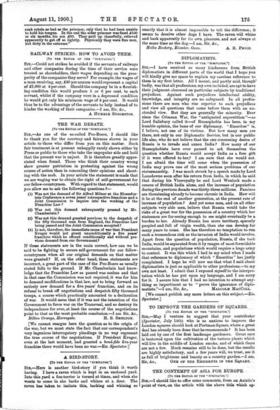THE WAR DEBATE.
[TO THE EDITOR OF THE "SPECTATOR."]
Sin,—As one of the so-called Pro-Boers, I should like to thank you for the courtesy and fairness shown in your article to those who differ from you on this matter. Such fair treatment is at present unhappily rarely shown either by Press or public to those who take the unpopular side and hold that the present war is unjust. It is therefore greatly appre- ciated when found. Those who think their country wrong show greater patriotism in protesting against the wrong course of action than in concealing their opinions and shout- ing with the mob. In your article the statement is made that we are waging war to obtain the right of self-government for our fellow-countrymen. With regard to that statement, would you allow me to ask the following questions ?- (1) Was not the demand of Sir Alfred Milner at the Bloemfon- tein Conference a seven years' retrospective franchise and a Joint Commission to inquire into the working of the Franchise Law ?
(2) Was not this demand subsequently pressed by Mr. Chamberlain ?
(3) Was not this demand granted previous to the despatch of the fifty thousand men from England, the Franchise Law being passed and the Joint Commission accepted ?
(4) Is not, therefore, the immediate cause of war that President Kruger would not grant unconditionally a five years' franchise which he offered conditionally and without pre- vious demand from our Government?
If these statements are in the main correct, how can we be said to be fighting to secure self-government for our fellow- countrymen when all our original demands on that matter were granted? If, on the other hand, these statements are incorrect, a great part of the case of the Pro-Boers as usually stated falls to the ground. If Mr. Chamberlain had know- ledge that the Franchise Law as passed was useless and that in that case the Commission was not required, it was for him to demand modifications in that law, not to bring forward an entirely new demand for a five years' franchise, and on its refusal to break off negotiations and despatch fifty thousand
troops, a course which practically amounted to a declaration of war. It would seem that if it was not the intention of the Government to force war on the Transvaal, and so destroy its independence for ever, at least the course of the negotiations point to that as the most probable conclusion.—I am Sir, &c.,
[We cannot reargue here the question as to the origin of the war, but we must state the fact that our correspondent's very ingenious interrogatory pleadings in no way represent
the true course of the negotiations. If President Kruger, even at the last moment, had granted a bonci-ftcle five-year franchise there would have been no war.—En. Spectator.]


































 Previous page
Previous page